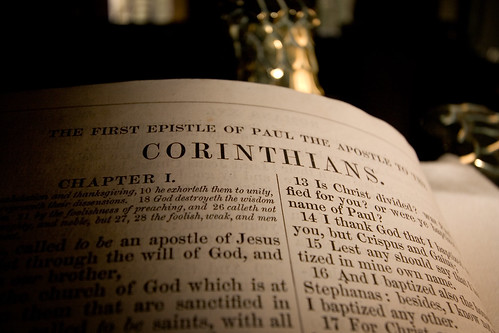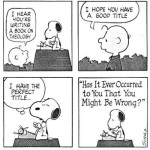We run our website the way we wished the whole internet worked: we provide high quality original content with no ads. We are funded solely by your direct support. Please consider supporting this project.
On Biblical Inerrancy

Matthew Kirkland via Compfight
In this essay, Peter Enns explains his views on Biblical inerrancy and the complexities encountered as evangelicals attempt to define the term.
From the essay:
Speaking as a biblical scholar, inerrancy is a high-maintenance doctrine. It takes much energy to “hold on to” and produces much cognitive dissonance. I am hardly alone. Over the last twenty years or so, I have crossed paths with more than a few biblical scholars with evangelical roots, even teaching in inerrantist schools, who nervously tread delicate paths re-defining, nuancing, and adjusting their definition of inerrancy to accommodate the complicating factors that greet us at every turn in the historical study of Scripture.
(Disclaimer: We link to various articles and blog posts not necessarily because we are in 100% agreement with them, but because we think they offer a perspective worth thinking about)
Related Reading

Reflections on the Supremacy of Christ (Part 1)
In my previous post I argued that the Bible tells a story in which the culminating event – the coming of Christ – reframes everything that preceded it. Though it is all inspired, not everything in it should carry equal weight for us. Rather, everything leading up to Christ, including the portraits of God, must…

Thou Shalt Not Fear Science
Bev Mitchel is a person I’ve just recently been introduced to. He’s among an increasing chorus of scholars who believe it’s time for Evangelicals to stop being afraid of science and to instead seriously integrate it into our reading of Scripture and theological reflection. Here is a little piece he wrote for Jeff Clarke’s (very informative) website integrating…

Lighten Up: Theology
I stole this from a reader’s Facebook page. (Thanks Kevin.) It’s good to remember that we don’t really have it all figured out.

The Bible is Infallible NOT Inerrant
While the cruciform understanding (explained here) of the “God-breathed” nature of Scripture is in tension with the way most talk about inerrancy (See previous post on inerrancy), I do not believe it is at all incompatible with what the Church has always sought to express by affirming the “infallibility” the Scripture. The core conviction is that Scripture will…

Lighten Up: Believing in Believing
OK, we don’t really think this is the difference between theology and philosophy, but how does this guy not get that not believing in believing is, itself, a belief?

Podcast: If the Cross is the FULL Revelation of God, Why Do We Even Need All the Rest?
Greg discusses the summation of the Bible in the crucifixion. http://traffic.libsyn.com/askgregboyd/Episode_0285.mp3
